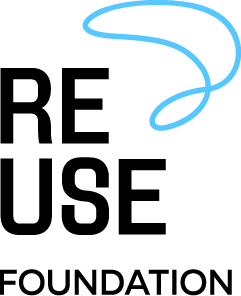Featured
DEPENDING ON YOUR VIEW, GLOBAL COMMITMENT 2024 RESULTS SHOW ‘SUBSTANTIAL PROGRESS’ OR IMPRESSIVE GREENWASHING |
|
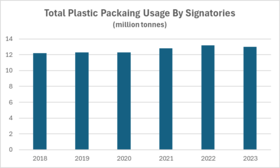
|
In the world of plastic packaging, the Global Commitment is a big deal, and the latest results were just released.
Launched in 2018 by the Ellen MacArthur Foundation, in collaboration with the UN Environment Programme, the Global Commitment unites “over 1,000 organisations from across the world, including businesses representing 20% of all plastic packaging produced globally and over 50 government signatories”. It’s the primary way plastic packaging is governed. Ellen MacArthur Foundation says it brings together “businesses, governments, NGOs, and investors behind a common vision of a circular economy in which we eliminate the plastic we don’t need; innovate towards new materials and business models; and circulate all the plastic we still use, to keep it in the economy and out of the environment”. It sounds great. We’re five years in and its report talks of “substantial progress” and how Global Commitment business signatories, and particularly the top quartile, have outperformed the market across nearly all target areas”. It gives various data points to support this. Here’s one: “…through the Global Commitment, the business signatories have had a substantial collective material and climate impact. They have increased their use of recycled plastics by 1.5 million tonnes per annum… this is equivalent to keeping 1 barrel of oil in the ground every 2 seconds, or more than 15 million barrels of oil a year. Doing so also avoids 2.5 million tonnes of CO2 per year – equivalent to eliminating the carbon emissions of a city of 500,000 people. The strong growth in recycled plastics use, combined with keeping the overall growth in plastic packaging use below market average, has resulted in avoiding 2.8 million tonnes of virgin plastics production a year compared to business as usual – equivalent to more than the UK’s annual plastic packaging use." This is impressive as far as it goes but is it really a solution to single-use plastic? The Global Commitment focuses on plastic composition – replacing non-recyclable plastics with other plastics and replacing virgin plastic with used/recycled plastic. But it’s all plastic and almost all of it goes to waste.OECD tell us just 10% or so of plastic gets recycled worldwide, and in nearly four decades, by 2060, it will still be only 17% in the baseline, current trends scenario. Most goes to landfill and incineration, but a chunk escapes to the environment. So how does changing the composition of plastic help? Worse, the Global Commitment does not require signatories to set targets for overall plastic usage, which means signatories can use ever more. We see this in the data that shows total plastic use by brand and retail signatories continues to rise. Since 2018, signatories have used 63.6 million tonnes and use more each year than in 2018. In 2023, total use was 6.6% higher than in 2018. By far the majority of this is single-use plastic that is used once before going to waste. The Global Commitment did a wonderful job galvanising support but, unfortunately, its flawed targets cannot solve the issue it highlighted, and it does a disservice by claiming ‘substantial progress’ when plastic use proceeds unabated. As ever, we need to shift to policies that make a difference, and the most attainable and meaningful is reuse (and on that, Ellen MacArthur Foundation reports that since 2019, the share of plastic that signatories say is reusable has fallen from 1.6% to 1.3% in 2023).[Image Credit: © REUSE Foundation] |
Highlights
Paris 2024 Olympics Reduces Single-Use Plastic |
|
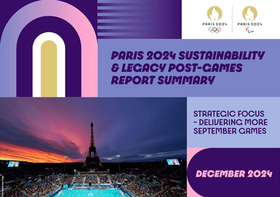
|
Paris 2024 Olympic and Paralympic Games significantly reduced plastic waste by cutting single-use plastic in drinks distribution by 52 percent, including a 70 percent drop in single-use bottles compared to London 2012. Measures included reusable packaging, free water fountains and extensive public awareness campaigns, with 80 percent of spectators bringing refillable bottles. 79 percent of waste was recovered or avoided, and greenhouse gas emissions were 54.6 percent lower. There has been criticism about certain of the reuse practices, such as the use of single-use bottles for refills. [Image Credit: © International Olympic Committee]
|
Plastic-Free Toothpaste Tablets Could Revolutionize Oral Care |
|
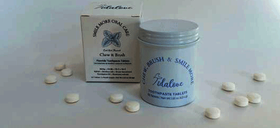
|
US-based Tidalove launched eco-friendly fluoride toothpaste tablets, offering a sustainable alternative to traditional toothpaste tubes. Packaged in compostable paper refills or reusable tins, the tablets help reduce single-use plastic waste. Compact and ideal for travel, they eliminate clutter and are TSA-approved. [Image Credit: © openPR/Tidalove]
|
Oasis Launches Recyclable 10L Water Dispenser Bottles In South Africa |
|
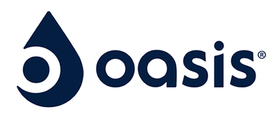
|
Oasis Water introduced what it claims is South Africa’s first fully recyclable 10L PET dispenser bottles. Part of Oasis’s “Water Exchange” program, the bottles are designed for high recyclability. Oasis Water’s efforts align with rising plastic recycling rates in South Africa. Oasis Water will undertake further research next year to transition its 20L bottles to PET.[Image Credit: © Oasis Water (Pty) Ltd]
|
Whole Foods Refill Stations Cut Plastic Waste |
|
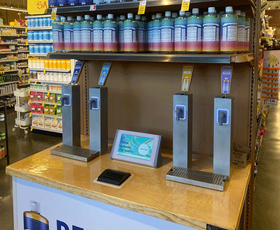
|
Whole Foods introduced refill stations at select California stores, allowing shoppers to reduce plastic waste and save money. Powered by Wonderfil’s "smart" technology, the stations let customers refill containers with Dr. Bronner's fair trade organic soap, avoiding single-use plastic bottles. Refilling saves consumers 13 percent compared to buying new bottles, and those without containers can purchase reusable ones made from post-consumer plastic. [Image Credit: © SANTA CRUZ WORKS] |
US Plastics Pact Advances Circular Economy Goals |
|
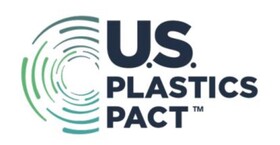
|
US Plastics Pact’s 2023-2024 Impact Report highlights progress toward reducing plastic waste through circular economy initiatives. Achievements include eliminating problematic materials, raising sustainable packaging adoption to 50 percent and increasing post-consumer recycled content to 11 percent. Key innovations include Eastman’s molecular recycling facility and Kraft Heinz’s transition to recyclable paperboard, but the report underscores the need for federal policies like standardized recycling definitions and extended producer responsibility programs to scale infrastructure and advance circularity. [Image Credit: © U.S. Plastics Pact]
|
Tree Bark Packaging Revolutionizes Waste Reduction |
|
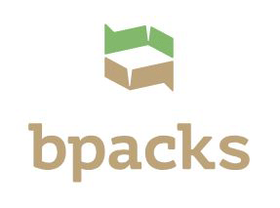
|
UK-based Bpacks developed innovative bark-based packaging, offering a 100% home-compostable, sustainable alternative to plastics. It’s compatible with existing manufacturing processes and extends the shelf life of perishable goods by up to 7 days. Partnering with Serbian retailer Gomex, Bpacks is commercializing its eco-friendly solution across 300 stores in Southern Europe and plans to establish a production facility in Spain by 2025 for European and US markets. [Image Credit: © Bpacks]
|
Global Plastic Treaty Progressed, Critical Issues Remain |
|
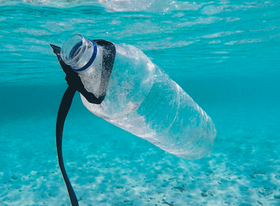
|
Unilever’s Ed Shepherd highlights recent progress in negotiations toward a UN treaty aimed at curbing plastic pollution. While a binding global agreement remains elusive, a middle-ground approach on key issues like eliminating harmful plastics and regulating production gained traction. However, uncertainty persists around crucial elements like Extended Producer Responsibility and the treaty's scope. Unilever calls for robust, mandatory global rules to effectively reduce plastic waste and drive sustainable change. Another round, next year, is possible for countries most committed to finalizing stronger commitments.[Image Credit: © Brian Yurasits on Unsplash]
|
Paper-Based Packaging Innovations For Sustainable Drinks |
|

|
Smurfit WestRock is introducing beverage packaging with innovative paper-based solutions aimed at reducing plastic waste. Their paper-based multipacks and carriers, including successful applications for major brands like Liberty Coca-Cola, replaced significant amounts of plastic. The designs maintain functionality while being recyclable and visually appealing.[Image Credit: © Smurfit Westrock] |
Ocado Expands Reusable Packaging For Online Orders |
|

|
Ocado Retail, which already introduced reusable packaging for staples like rice and pasta, is expanding the scheme to laundry products. Customers receive products in reusable containers, which they return at subsequent deliveries. Launched in partnership with the UK Refill Coalition, the scheme aims to create scalable industry-wide standards for reuse in online retail. [Image Credit: © Ocado Retail Limited]
|
Origami Packaging To Reduce Plastic Waste |
|

|
A project led by Finland’s VTT Technical Research Centre introduced origami-inspired cardboard packaging as an alternative to plastic and expanded polystyrene. This innovation transforms paperboard into flexible, lightweight and durable designs using automated folding techniques inspired by traditional origami and should appeal to industries like cosmetics, luxury goods and e-commerce. Currently in a pilot phase with industry partners, commercial rollout could be in 3-5 years. [Image Credit: © VTT Technical Research Centre of Finland Ltd]
|
FDA's New Focus On Packaging Chemicals Under Trump |
|

|
The FDA's oversight of food packaging chemicals could shift under the new administration, with Marty Makary's likely appointment to head the agency, there could potentially be stricter scrutiny of harmful substances. While the focus is on food additives, packaging materials could also face re-evaluation, particularly recycled plastics, which may undergo more rigorous post-market reviews. Environmental advocates, such as Robert F. Kennedy Jr., have expressed interest in reforming plastic regulations, including eliminating harmful chemicals in packaging. [Image Credit: © Food and Drug Administration]
|
UK Household Plastic Packaging Collection Data Summary 2024 |
|

|
This year’s UK Household Plastic Packaging Collection Survey reveals key statistics on recycling rates for plastic packaging. In 2023, 43 percent of plastic packaging was collected for recycling, with plastic bottles leading at 65 percent. Plastic film and other flexible packaging remain challenging, with collection rates significantly lower. The report highlights the role of Extended Producer Responsibility and Deposit Return Schemes in improving recycling rates and reducing plastic waste. [Image Credit: © RECycling of Used Plastics Ltd (RECOUP)]
|
Coke Accused Of Burying Bad News On Reuse Targets |
|

|
Coca-Cola is being criticized for quietly abandoning its pledge to achieve 25% reusable packaging by 2030. It seems to have dropped its 2022 commitment without formal announcement and removed it from its public sustainability pages. Environmental advocates Break Free from Plastic argues that Coca-Cola's move is a major setback in the global push to reduce plastic waste and said: “If they can’t even keep their low-bar commitments, how can they claim to be serious about addressing the global plastic crisis?” [Image Credit: © The Coca‑Cola Company]
|
Refill Pouches Are Not the Plastic-Free Solution We Need |
|
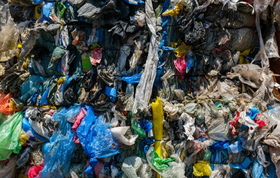
|
Refill pouches, often marketed as eco-friendly, may worsen the plastic waste problem, according to an article from The Powder Shampoo, a powder-to-foam personal care products company. It argues that the pouches are made from non-recyclable multi-layer plastics, leading to more landfill waste. Despite claims of sustainability by brands like Unilever and Procter & Gamble, refill pouches often contain virgin plastic and have a limited lifespan. [Image Credit: © Engin Akyurt on Unsplash]
|
US Retreats From Stronger Global Plastic Production Limits |
|
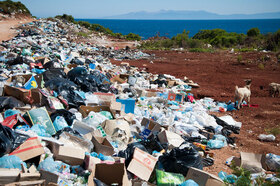
|
At the recent United Nations global plastics treaty negotiations in South Korea, the US reversed earlier support for limits on global plastic production, shifting toward a more flexible, voluntary approach, disappointing environmental advocates who argue that voluntary targets will not sufficiently reduce plastic pollution. Some countries and many environmental groups are calling for stricter limits to curb the escalating plastic crisis, warning that without such measures, plastic waste will continue to accumulate in ecosystems and contribute to climate change.[Image Credit: © Antoine GIRET on Unsplash]
|
Plastic Waste Alliance Fails To Reduce Pollution Impact |
|
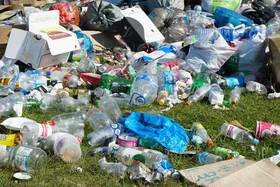
|
A recent analysis revealed that five major companies behind the Alliance to End Plastic Waste have produced more than 1,000 times the amount of plastic waste they’ve removed from the environment. These companies, including ExxonMobil, Shell and Dow, together produced 132 million tonnes of plastic between 2019 and 2023. [Image Credit: © Ariungoo Batzorig on Unsplash] |
Supermarkets To Boost Refill And Reuse Efforts |
|
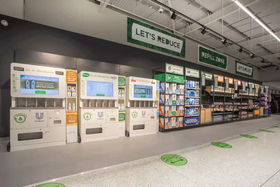
|
A new phase of the UK’s Plastics Pact will push supermarkets to expand refill and reuse options in a bid to reduce plastic waste. Despite past challenges with consumer participation and trial setbacks, including store closures and low engagement, retailers are encouraged to ramp up efforts, with new targets for 2025 and beyond. The initiative aims to help achieve the UK’s plastic reduction goals, including moving 30 percent of supermarket product sales to reusable or refillable packaging by 2035.[Image Credit: © ASDA]
|
Material Science Innovations Help Tackle Packaging Waste |
|
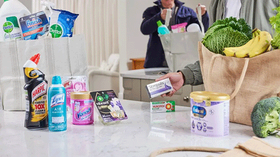
|
Martin Settle, Senior Manager of Polymer Science in Sustainability and Packaging at Reckitt, says innovation, including in packaging, often takes years of research and testing to produce the best. Small molecular changes can lead to more sustainable materials for packaging, emphasizing the importance of practical, cost-effective solutions. Innovations like biopolymers are considered promising for certain applications, though potential limitations, such as recyclability and environmental impact, are critical. Companies are also investigating alternative materials like chitosan derived from crustacean shells. A key challenge remains balancing environmental benefits with consumer and market demands.[Image Credit: © Reckitt Benckiser Group PLC]
|
SC Johnson Advances Global Plastic Waste Reduction Efforts |
|
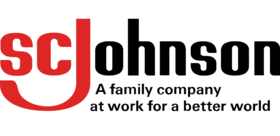
|
SC Johnson showed progress in reducing plastic waste, according to the latest Global Commitment 2024 Progress Report from the Ellen MacArthur Foundation and UN Environment Programme. It has met its virgin plastic reduction goal a year ahead of schedule, cutting its plastic footprint by 32%, and surpassed its target for incorporating recycled materials into packaging. 12 percent of its packaging is designed for reuse. SC Johnson emphasizes the need for government regulation to help drive further progress, highlighting the forthcoming talks towards a global plastics treaty.[Image Credit: © SC Johnson/PRNewswire]
|
